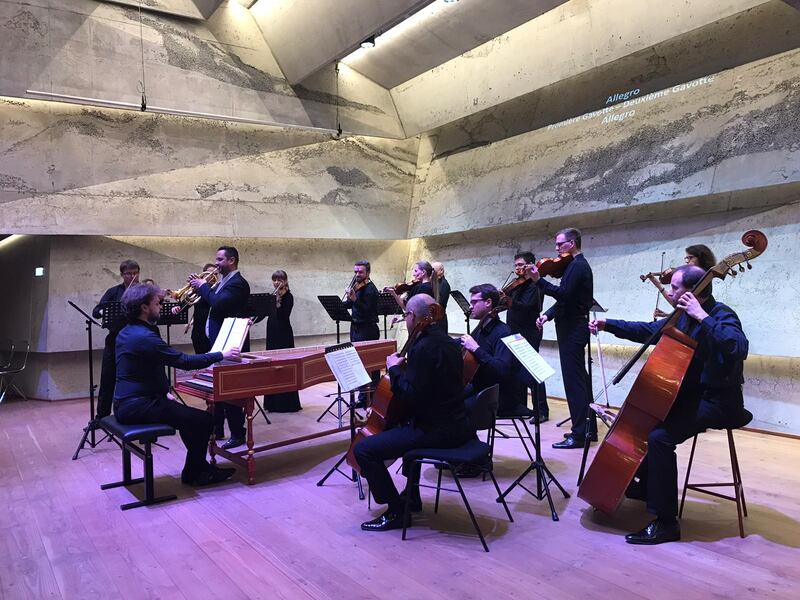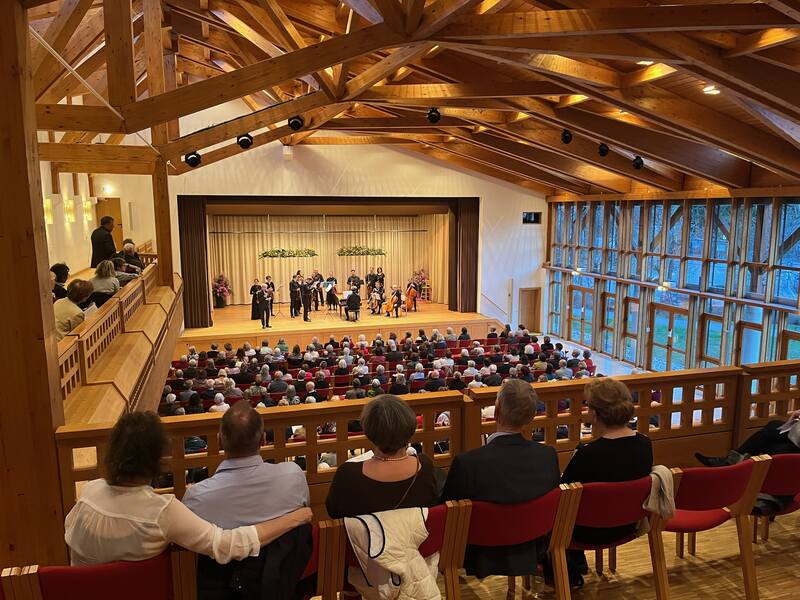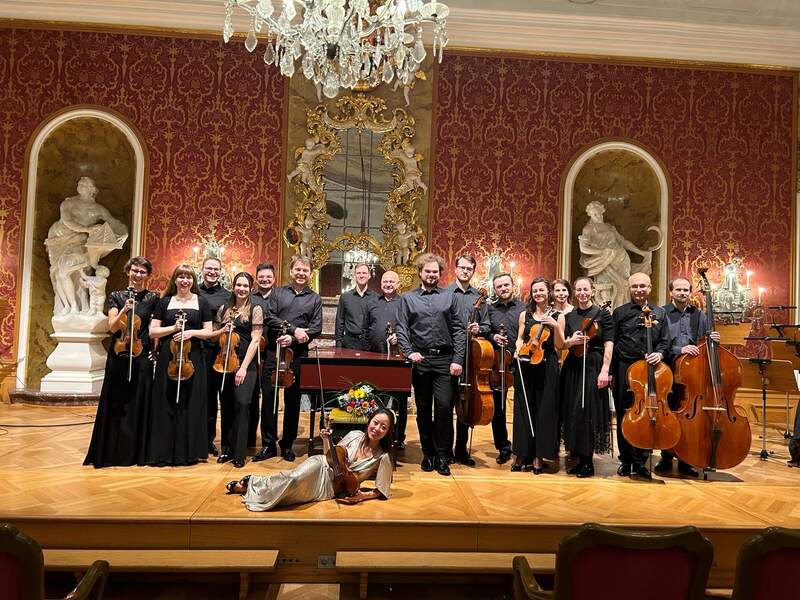The chamber ensemble of the Janáček Philharmonic Orchestra Ostrava played in seventeen concert halls across Germany
Seventeen concerts in nineteen days and approximately five thousand kilometers traveled.
In March, the chamber ensemble from the Janáček Philharmonic Ostrava, composed of members of the Janáček Chamber Orchestra and guests, embarked on a tour of Germany. Along with soloists Gábor Boldoczki (trumpet) and Elly Suh (violin), they presented the music of French and German Baroque in two different programs. Thanks to the arrangements of the original musical parts and the precise study of all the pieces, audiences in seventeen cities across Germany were transported not only to the era of French King Louis XV.

They spent almost fifty hours on the road. They traveled across the country of our western neighbor from the south to the northwest, performing in seventeen different concert halls. “The tour began in Landshut, then the ensemble moved further away from our borders through Dachau Castle and closer to Munich. Then the tour continued to the Dutch borders, and the last concert stop was even near the Swiss borders, just a stone’s throw from Basel,” describes Jan Žemla, the director of the Janáček Philharmonic, detailing the concert journeys of the JPO Chamber Ensemble. He adds that the three-week tour was arranged by the JFO management and the organizing agency approximately three years in advance. The variety of concert halls placed high demands on the orchestra manager, who was responsible for ensuring quality conditions for the players both backstage and on stage during the tour. “Tuning into the atmosphere and acoustics of each hall is quite an important process. For example, the hall in Pullach is more of a theatrical than a concert space, so we always work with the organizers on site to adjust the stage lighting to suit both the concert’s atmosphere and the players themselves,” explains orchestra manager Petr Dvořák.
Two programs with two top soloists
During the concert tour, the JFO Chamber Ensemble presented two different programs with two different soloists. “The first program was based on a joint concert with Gábor Boldoczki, the world’s leading trumpeter, which premiered at the end of February at the Vesmír in Ostrava as part of the Chamber Cycle K and focused on French Baroque music,” says Petr Dvořák, adding that Boldoczki had the original scores of selected pieces arranged so they could be played on the trumpet and flugelhorn at all.
“Baroque music does not originally count on this instrument. The original parts were written for string instruments and harpsichord,” adds Dvořák. With Boldoczki, the orchestra performed six concerts in Germany, and eleven more with Korean-American violinist Elly Suh, with whom they immersed into German Baroque music. “Originally, we prepared this program with Japanese violinist Moné Hattori, but about three weeks before the start of the tour, she had to withdraw for serious health reasons,” explains Dvořák. Consequently, the organizing agency cast the distinctive Elly Suh for the project.

Interpretation of early music on modern instruments and playing while standing
A major challenge for the artistic director of the chamber orchestra and simultaneously the concertmaster and first violinist of the JFO, Jakub Černohorský, was the preparation of the programs for both concerts. His task was to ensure the uniformity of the sheet music and prepare the entire ensemble for the interpretation of early music so that it could be performed as authentically as possible in collaboration with the soloists. “Playing early music on modern instruments is not an easy task. Instruments have changed since then; for example, gut strings have been replaced by metal and synthetic strings, and Baroque bows are mostly no longer used on modern instruments. Therefore, during preparation, we had to compensate for these handicaps so that we did not stray too far technically from the authentic sound of a Baroque ensemble. It was also necessary to rework and unify the parts musically in terms of phrasing so that they corresponded with the musical aesthetics of the German and French Baroque styles,” explains Jakub Černohorský. The interpretation of Baroque composers’ pieces without a classical conductor also places great demands on all players. “I consider it important for the players within the ensemble to musically perceive each other similarly to, for example, a string quartet. Only in this way can we achieve an organic whole and mutually respond to each other, which adds the crucial dynamic to the overall performance,” adds Černohorský, noting that all players, except the harpsichordist, cellists, and double bassist, performed the very demanding two-hour concerts standing up. Their reward was the applause of sold-out halls. “The German audience has a deeply rooted tradition of listening to classical music, which is especially noticeable at chamber concerts. The listeners know exactly when to applaud and how to behave at concerts, and they also carefully study the prepared program,” clarifies Petr Dvořák.

Foreign tours are one of the key activities of the Janáček Philharmonic Orchestra Ostrava
The Janáček Philharmonic Ostrava, or its chamber ensemble, regularly embarks on foreign tours and concerts. In 2023, the orchestra completed a two-week tour of Japan and repeatedly performed at the Cavatina Hall in Poland during its seventieth concert season. The interpretative quality of the JPO is evidenced, among other things, by recurring invitations from foreign concert and organizing agencies. “Foreign concert activities are not only a prestigious matter for us, enhancing the reputation of our orchestra, but also a way to gain new experiences by performing in various concert halls and maintaining or establishing valuable contacts,” concludes JFO director Jan Žemla. In the near future, the Ostrava Philharmonic will perform abroad at the end of April as part of the Allegretto Festival in Žilina, and in June, they will head to the Musikverein in Vienna, accompanied by piano virtuoso Lukáš Vondráček.
Interview taken from the online daily Patriot Magazine, April 18, 2024.

